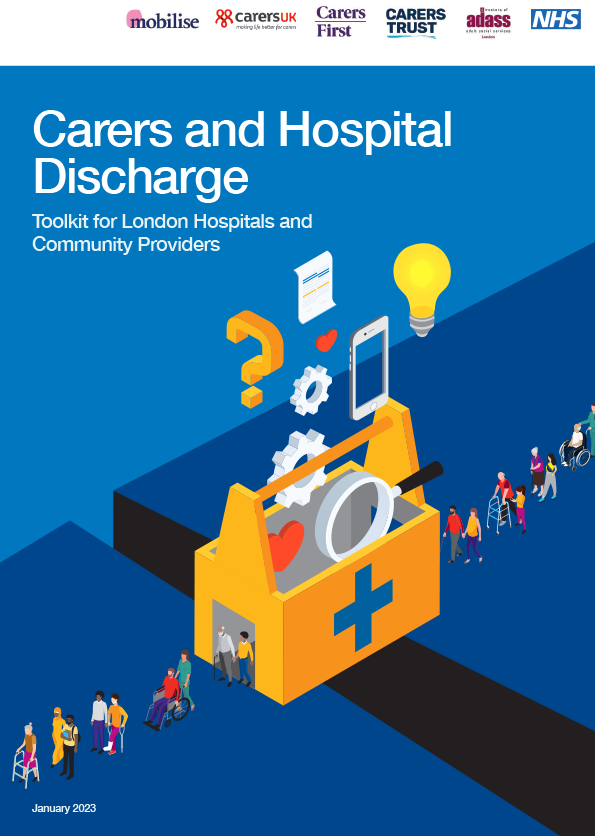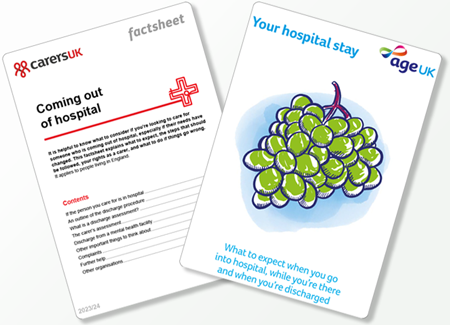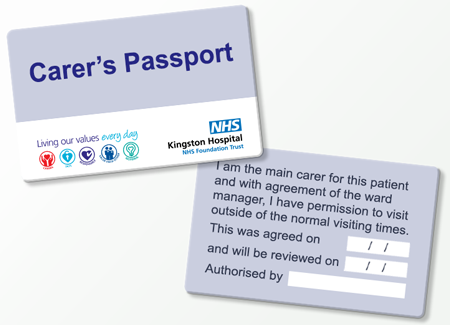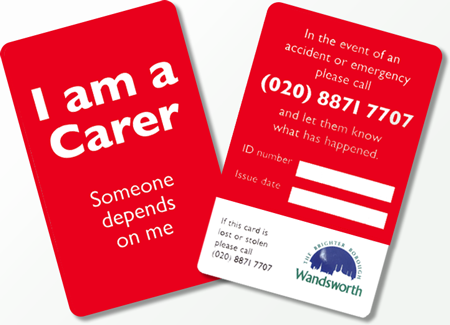Hospital Discharge Information
Kingston Hospital, in partnership with Richmond Carers Centre and Kingston Carers Network, has launched resources to support carers if their cared for person is admitted to hospital and following their discharge. This initiative follows the creation of the NHS Carers and Hospital Discharge Toolkit.
Carers and hospital discharge toolkit

NHS London has launched a new Carers and Hospital Discharge Toolkit to improve the experiences of carers and the people they care for during the hospital discharge journey.
This has been co-produced with carers and in partnership with Carers UK, Mobilise, Carers First, Carers Trust and the London Association of Directors of Adult Social Services (ADASS).
For more information and to have a look at the toolkit, see the following link: https://carers.org/downloads/carers-and-hospital-discharge.pdf
Useful guides for hospital admittance and discharge
 Carers UK and Age UK have created some useful guides on what to expect when your cared for person is admitted to hospital.
Carers UK and Age UK have created some useful guides on what to expect when your cared for person is admitted to hospital.
Kingston Hospital have published information pages to provide advice for unpaid carers who are supporting a cared for person being admitted to or discharged from hospital. The information is relevant to all hospitals (not just Kingston) and is appropriate for all unpaid carers (not just family members).
> Carers’ Clinical Liaison Service for unpaid carers – Kingston Hospital
> Advice for people who care for others – Kingston Hospital
> Advice for carers in the first 48 hours after discharge – Kingston Hospital
> Advice for young carers – Kingston Hospital
The Carer’s Clinical Liaison Service
At Kingston Hospital, we have a Carers’ Clinical Liaison Service supporting unpaid carers whenever they need us, either as a patient with caring responsibilities, or accompanying a patient who couldn’t cope without them. During an Outpatient Appointment or a hospital inpatient stay, the Carers Clinical Liaison Practitioners are there to listen to you, amplify your voice when it comes to making decisions about treatment, care and hospital discharge and to connect you to services and support for carers in your local area. We hope that our service and the information available for unpaid carers is supportive and recognises both your role as an unpaid carer, and also, the choices that you might face as a carer when accessing hospital services for yourself or someone you care for. We are here for carers young and not so young to support you throughout your hospital journey and a smooth connection to onwards support following hospital discharge. To get in touch, please ask any member of the clinical team caring for you to make a referral to the Carers’ Clinical Liaison Team, Kingston Hospital NHS Foundation Trust.
Laura Greene
Head of Volunteering & Community Partnerships at Kingston Hospital
Kingston Hospital launched their Carers Clinical Liaison Service last year. This service is available to unpaid carers in any borough. A Carer’s Clinical Liaison Practitioner will sit with the unpaid to create a Support Plan to help with issues such as:
- emergency planning
- benefits and entitlements for carers
- social isolation
- accessing a Carers’ Assessment
- accessing counselling services
- putting together a carer’s agreement
This page outlines further information on the service:
https://kingstonhospital.nhs.uk/information/carers-clinical-liaison-service-for-unpaid-carers/
The Carer’s Clinical Liaison Service is there to help whilst the person you care for is in hospital. If you need support once they are discharged, you should speak to your Local Authority Adult Social Care Service, your GP, or your local Carers’ Centre. They may be able to put some extra help in place to benefit you and the person you care for.
What happens whilst the person you care for is in hospital?
It can be a very stressful time if your cared for person is admitted to hospital. It is important to speak to hospital staff and alert them to the fact you are their carer. You may wonder what it will be like when they come out of hospital. It is important to note that caring is a choice and it should not be assumed that you wish to do it.
Kingston hospital staff can support you in a number of ways whilst the person you care for is in hospital.
During this time, you may wish to take a back seat and let hospital staff do all the care. Or you may wish to continue to help. Any member of staff, or the Carers’ Clinical Liaison Practitioner, can help you design a Carer’s Agreement. This is a document which tells staff how much care (such as feeding, washing, dressing) you would like to give whilst the person you care for is in hospital, and what aspects of their care you would like the hospital to provide. You can ask the nurse in charge of the ward for a Carer’s Passport, which allows you to spend as much time as you would like with the person you care for, during and outside of normal visiting hours. In certain circumstances, the hospital can arrange for overnight accommodation if you want or need to provide care overnight.
 You can also expect to be involved in ‘discharge planning’. As a carer, you have a right to be involved in all discussions and decisions about the discharge plan for the person you care for.
You can also expect to be involved in ‘discharge planning’. As a carer, you have a right to be involved in all discussions and decisions about the discharge plan for the person you care for.
If you feel that the hospital admission has affected you as an unpaid carer in any way, you are encouraged to speak to any member of clinical staff about these feelings and challenges. If appropriate, they may refer you to the Carers’ Clinical Liaison Practitioner who can talk to you and develop a support plan. This is designed to ensure you have the help and support that you are entitled to. To arrange a referral, speak to the nurse in charge of your ward.
Kingston Hospital have created a useful page on advice for people who care for others. This includes information on your rights and entitlements as a carer. See also our page covering Rights and Entitlements. There is also a page on Young Carers.
Plan ahead
It can be helpful to have a plan for yourself and the person you are caring for in case something happens to you. Carers UK has more on how to create such a ‘contingency plan’.
End-of-life planning
The healthcare team looking after the person you care for may talk to you both about Advanced Care Planning. This means, should the patient be unable to make decisions in the future, care professionals can ensure their wishes are upheld. Ask your ward team or the palliative care team for more information. The NHS website also has more on this.
 Carer’s Emergency Card
Carer’s Emergency Card
Some local authorities, such as Richmond, offer Carer’s Emergency Cards. This is a card for you to carry with you at all times. It is recognised by local emergency services. This scheme ensures that emergency cover can be put in place if something happens to you.
Lasting Power of Attorney
It is sensible for us all to appoint someone we trust to make decisions for us when we no longer can. This is called giving someone ‘lasting power of attorney’. It can be for property and financial affairs and/or for health and wellbeing decisions.
You can only appoint a power of attorney if you have ‘capacity’. This is a legal term which means you can understand and use information to make a decision, and communicate these decisions. So it is important to put this in place before you lack the capacity to do it.
The person you care for may wish to appoint a lasting power of attorney for when the times comes. Carers UK has more on this.
Writing a will
A will is the only way to ensure that a person’s possessions, property and finances go to the people and causes that are important to them. It is worth asking the person you care for if they have a will in case something happens to them. Age UK has more on this.
First aid
Consider getting first aid training to prepare yourself for an emergency. There are some free introductory courses available with St John’s Ambulance.
Advice for carers in the first 48 hours after discharge
Some tips to think about when you loved one is discharged from hospital.
Plan for an emergency
It is sensible to be prepared in case something happens to you or the person you care for.
- Apply for a Carers Emergency Card (see above).
- Keep a list of emergency contacts in a useful place, such as on a fridge.
- Create a contact in your phone called ‘In Case of Emergency (ICE)’. Here you can list the details of who you wish to be called in an emergency.
Medicine
The person you care for should have been sent home with enough of their medicines for 7 days. If they need to continue taking them beyond the first week, it is important to get a repeat prescription from their GP. Remember, some surgeries require 48 hours’ notice to process prescriptions.
Your local pharmacy can help you both to understand the prescriptions. If the person you are caring for has been prescribed a new medicine to treat a long-term condition, they may be able to get extra help and advice about the medicine from their local pharmacist through a free scheme call the New Medicine Service. The pharmacist will support you over several weeks to use the medicines safely and to best effect.
Contact the ward for advice if the person you care for has not received enough medicines for the first 7 days, or has not received their TTO (To Take Out) medicines form.
Equipment
The person you care for may have been provided with equipment to use at home. It is important that they and/or you have been shown how to use it. Contact the ward team if you have questions about this after discharge.
To access equipment after your cared for person has been discharged from hospital they will need to have an occupational therapy assessment. Following the assessment, equipment can be provided on loan to support independent living. You can ask your GP for a referral or you can contact the Adult Social Care team for further information.
Click here for further information on getting support with equipment and home adaptations from the local authority when your cared for person is at home.
Support
If you would like to speak to one of the Adult Carer Support Team about any difficulties you are facing at this time please call the support line on 020 8867 2380 or email support@richmondcarers.org
